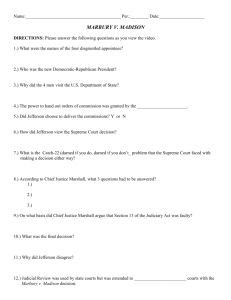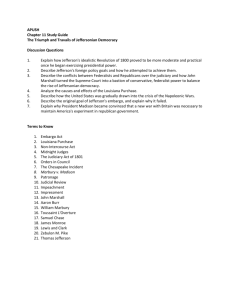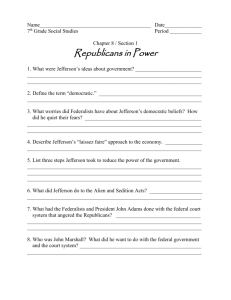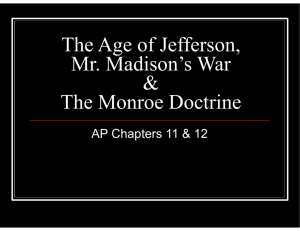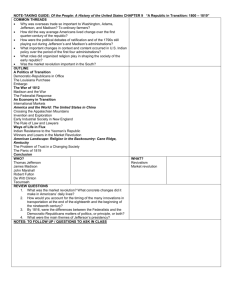CHAPTER 8 Western Settlement and Eastern Capitalism
advertisement
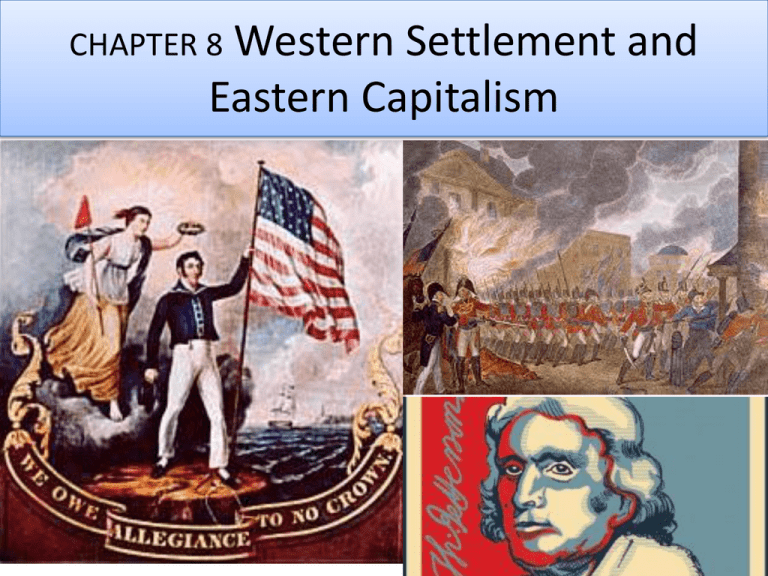
Western Settlement and Eastern Capitalism CHAPTER 8 The Western confederacy and Mad Anthony Wayne • The treaty of Paris of 1783 left the Indian Nations to the care of the American States. Americans were going to expand Westward and Even Extirpating the natives was not beyond the scope of possible solutions to the Indian Problem. Under the guidance of Miami Chief Little Turtle, The Western Confederacy was formed to block white expansion in the Ohio River Valley. The Confederacy, consisting of Shawnees, Miamis, and Potawatomis, They were successful holding Americans back, Until George Washington sent Mad Anthony Wayne In the Battle of Fallen Timbers, to force them to cede the land, and come under American Sovereignty. • Even with the victory of Fallen Timbers, The Confederacy was strong enough to force a compromise. In the Treaty of Greenville 1795, American Negotiators acknowledged the Indian ownership of the Ohio River Valley, And Land was to be purchased from the Indians, not taken. In Return, the Indians agreed to be placed under the protection of the United States. • The conflict was only abated, and by 1805, a Shawnee named Lalawethika , Who had been a victim of white man’s drink, Sobered up, Called himself “Tenskwatawa” (the one that opens the door) and preached to his people to Shun American ways, denouncing alcohol, and calling for a return to traditional dress and food. Along with his Brother Tecumseh, They built a great confederacy, to reclaim lands ceded by other chiefs, But When the warrior Tecumseh left to persuade other chiefs to join the Confederacy , William Henry Harrison Marched on “prophets town”. Tenskwatawa told his men that the Master of Life would keep them alive and he attacked Harrison’s men at Tippecanoe River, but the master of Life did not keep them alive and Tenskwatawa lost his following. Tecumseh was later killed in the war of 1812. • The great mass of land had the advantage of creating opportunity for farmers, but it also came with the disadvantage of creating a barrier for getting crops to market. It cost Pennsylvania farmers as much to send crops fifty miles up the road to Philadelphia as it would to send it from Philadelphia to London. State Governments Chartered private companies to construct Turnpikes (toll roads) and canals. Many Farmers remained Self sufficient, making their own shoes and clothing, but staying poor. • In the 1780s Owners of Textile Mills In the Middle Atlantic and New England Constructed their mills along creeks and rivers to harness water power. • Charters included Iron Mining firms, Textile Manufacturing and even Banks. • From 1790 to 1820 Corporate charters granted in the US Included Eminent Domain provisions that allowed companies building turnpikes bridges or canals to force the sale of land that it required for these transportation routes. • Critics of the Commonwealth system that granted these charters, complained that it restricted the sovereignty of the people and gave too much power to corporations. Jefferson & the Pirates • In the 1790s Barbary States of North Africa systemically raided American Merchant ships So Federalist officials removed this threat by paying an annual bribe, “tribute” for “protection. Jefferson refused to pay the tribute and the “pirates” renewed their assaults. At first he ordered the navy to retaliate but to avoid an all out war and prevent a bigger national debt, Jefferson agreed to pay a reduced tribute. Napoleon’s Moves • Napoleon Bonaparte seized power in 1799 in France and aggressively sought empire in Europe and America, retaking Louisiana from Spain, and in violation of Pinckneys’ treaty, he directed Spanish officials to restrict American access to New Orleans, a vital port for Farmers using the Mississippi river. Jefferson had to question his pro French policy. Jefferson instructed Robert Livingston The ambassador to France to negotiate the Purchase of New Orleans. Fearing a French plan to establish an empire in America, Jefferson said; “the day that France takes possession of New Orleans… We Must Marry ourselves to the British Fleet and Nation.” At the time, (1802) Napoleon was dealing with strong resistance in Haiti and a new war threatening in Europe, So Napoleon offered to sell all of Louisiana for $15 million, as he could not defend Louisiana and fight a European war at the same time… and the cash would come in handy. Strict vs Loose Construction • In Contemplating The Louisiana Purchase, Jefferson realized that the constitution did not grant the power of the president to acquire territory and thought of creating a constitutional amendment in order to uphold his idea of “Strict Interpretation of the Constitution. But Madison talked him out of it because by the time the Amendment passed Napoleon could change his mind… Jefferson had to abandon his idea of Strict Interpretation and revise his view of Presidential powers under the Constitution. Meriwether Lewis & William Clark • In 1804 Jefferson Sent his Personal Secretary, Meriwether Lewis to explore the region with William Clark, Theirs was a scientific expedition, with objectives to map the area, report on the physical features as well as plants, and animals from the region and to find a pacific water route. And finally to make peace and establish trade with the Indians. Northern Secession! A dastardly conspiracy! • In response to the threat of a diminished power of the Northern States caused by the Louisiana purchase doubling the size of the country, Some Federalists talked of seceding from the union….When approached about leading this, Hamilton refused, so they turned to Aaron Burr, an ambitious man who might very well have gone along with this plan, but When Hamilton accused Burr of participating, burr Challenged Hamilton to a duel and shot and Killed him. Trouble with the Brits • The European War was good for American business, but neither the French or the British Respected American Neutrality (we were trading freely with both sides) The French seized American Ships that had stopped in Britain, and the British set up a blockade, also seizing goods on their way to France. The British also searched American ships for British Naval deserters impressed them back into labor. Many of these “deserters” were American Citizens. In 1807 the British attacked an American Naval vessel, the “Chesapeake” Killing or wounding 21 men and seizing 4 alleged deserters, Jefferson asked Congress to pass the EMBARGO ACT q12 p234 • As a result of the Embargo act of 1807 the American economy fell into a slump, and by 1808, exports had • plunged to about 1/5 the pre-embargo level. In 1809 Madison becomes President and reduces the Embargo to the NON-INTERCOURSE Act Which Only stops trade with Britain and France… Then he passes Macon’s bill #2 which states that the first of the two countries which agrees to respect our Neutrality, the U.S. will restore trade with them and continue to embargo the other. Napoleon Takes us up on this offer, without intending to respect it. Causes of War of 1812 British and French refused to respect the American neutrality and both countries seized American ship and confiscated goods intended for the other country .the Brits would also searched American ships for British Deserters and impressed them back into service…. Although many were actually American Citizens. British are bigger offenders • Not only are the British Impressing our soldier and confiscating goods, but they are supplying Indians with weapons and encouraging them to attack American Settlements. Speaker of the House Henry Clay and John C. Calhoun Push for War against England and a divided Congress barely passes the resolution for war The Bank Of The United States (BUS) • In the 20 years of the operation of the BUS since 1791, The bank used its lending power carefully and still managed to make an annual profit of 8%, but in 1811 President James Madison chose not to renew the Bank Charter, and forced Merchants Artisans, and Farmers to turn to State legislatures to charter new state banks. 3 years of fighting a war where Madison had difficulties financing the war effort brought new thinking to Madison. Madison’s War • From the beginning, The war was a disaster for the country and the Republicans . Federalists Banks In New York and New England refused to lend Money to the federal Government, so financing the war was a Nightmare. Thus In 1816 Madison reversed his Republican opposition to the National bank and approved the charter for the 2nd bank of the US • . In 1814 the British Overran the Americans in Washington DC and burned the White House to the ground. • Some victories for Americans were located on the Great Lakes Such As Commodore Oliver Hazard Perry victory over a small British Flotilla, and General William Henry Harrison’s triumph over a British and Indian force At the Battle of the Thames. Tecumseh, who was made a General in the British army was killed here. • Britain is still fighting the French and they are being drained militarily and financially. They are ready to negotiate an end. A Treaty is signed in January 1815 ending the war at a stalemate. The U.S. had Gained nothing over what it had before the war. At The Battle of New Orleans Jackson used a traditional deployment of regular troops including French speaking Black Americans and in February 1815 the Americans soundly defeat the British. ANDREW JACKSON BECOMES A GREAT AMERICAN HERO Federalists meet In Hartford Convention • Before the conclusion of the War, Federalist meet in Hartford Connecticut to discuss their opposition to the war and to the Republican control of government. One Proposal that is entertained is for the northern states to secede from the Union and form a new confederacy. • The Victory in New Orleans inspires a new sense of Nationalism, which comes down hard on Federalists… the party is utterly destroyed. In the election of 1818 Republican’s outnumbered Federalists 37 to 7 in the Senate, 156 to 27 in the House. • In 1816 James Monroe ( a Republican and Secretary of State under Madison) becomes President and his Secretary of State is John Quincy Adams (son of John Adams and a former Federalist). Historians have dubbed this period The Era of Good Feelings because the political system emerged as a one party, Republican Party system. The Republican Party itself split, but that would not become apparent PANIC! 1819 • By 1816 there were 246 state chartered banks with $68 Million dollars in Bank notes in circulation. Many of these banks were issuing money without backing in specie (gold) making bad loans to “friends of the bank” a sharp drop in world agricultural prices creates a credit crisis and farm income falls by 1/3 … farmers could not pay their bills, causing bankruptcies among merchants, store keepers and already over extended banks. John Marshall’s Supreme Court • Marbury VS Madison: William Marbury is a recipient of John Adams’ Midnight court appointments, But Jefferson & Madison refuse to pass out these Appointments and Marbury sues Madison to compel him to hand over the appointment. Marshall determines that the Judicial act of 1789 which allowed Marbury to take the court directly to the Supreme Court without Appeal, is Unconstitutional. This Case establishes the power to judge the constitutionality of laws (AKA JUDICIAL REVIEW) McCulloch vs Maryland • In McCulloch vs Maryland (1819) The State of Maryland imposes a tax on the BUS, primarily to assert States rights and to preserve the competitiveness of State banks. The BUS sues and State Lawyers make the Jeffersonian argument that congress lacked the constitutional authority to create a national bank, Marshall and the court rejected the States arguments, asserting Article 1 sec 8 elastic clause, and Marshall stated “The power to tax involves the power to destroy.” meaning the tax would render the federal bank at the mercy of the states. Fletcher Vs Peck • The State of Georgia makes a Land grant to the Yazoo Land company, citizens complained that this was a corrupt giveaway and a newly elected State legislature canceled the grant, alleging that it had been obtained through fraud and bribery. Speculators who had bought the land appealed to the supreme court and Marshall ruled that a contract was a contract and could not be broken. The speculators could keep the land. Dartmouth college vs Woodward 1819 • King George III granted a charter to establish Dartmouth college as a private institution of higher education, But in 1816 Republicans in New Hampshire’s legislature tried to convert the college into a public university. Trustees of the School brought in Daniel Webster to argue for them before the supreme court. Marshall held to his earlier ruling that a contract was a contract and even the State could not violate that. Cohens v Virginia 1821 • The State of Virginia finds Cohens guilty of selling illegal lottery tickets. Cohens appeals to Supreme court, but John Marshall sides with Virginia’s Supreme Court. But Marshall affirms the right to review State court decisions. • Cohens tries to sell National Lottery tickets In Virginia, but Virginia has a state lottery and has Outlawed the sale of other lottery tickets. Cohens appeals to the Supreme court but Virginia Representatives Claim the Federal Court does not have the right to review state court decisions. Marshall Agrees with Virginia’s prosecution of Cohens but maintains the right to review state court decisions. Gibbons v Ogden 1824 The End
